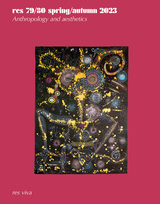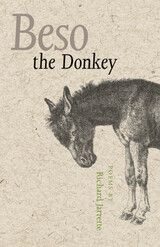
Beso the Donkey is a poetry cycle about a wounded, neglected, and abandoned jackass. In sparklingly clear and luminous poems, Richard Jarrette tells the story of Beso and of his caregiver's attempts to understand and heal him—an endeavor that teaches the man much about the meaning of life, death, peace, and acceptance. With undertones of Buddhist, Christian, Taoist, and Islamic faiths, Beso the Donkey incorporates elements of philosophy, ethics, religion, and morality.
As the book progresses, we sense the poet’s growing acceptance of life’s passing. Along with the author, we feel a deeper peace blossoming as Beso’s life is ending (which is itself a beginning). This is a lyrical story of loss and acceptance.
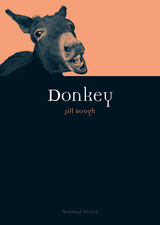
Though donkeys have historically been among our most useful domesticated animals—from plowing fields to navigating difficult terrain—they have been much maligned in popular culture and given very little respect. So much so, that their perceived qualities of stupidity and stubbornness have made their way into the language of insult. But in Donkey, Jill Bough champions this humble creature, proving that after 10,000 years of domestication, this incredibly hard-working animal deserves our appreciation.
Bough reveals the animal’s historic significance in Ancient Egypt, where it was once highly regarded—even worshipped. However, this elevated status did not endure in Ancient Greece and Rome, where donkeys were denigrated, ridiculed, and abused. Since that time, donkeys have continued to be associated with the poorest and most marginalized in human societies. All that time and all over the world, donkeys continue to be used for innumerable tasks, and even today, donkeys are considered to be one of the best draught animals in developing nations, where they continue to make a vital contribution. Bough rounds out her account with a look at the variety of social, cultural, and religious meanings that donkeys have embodied, especially in literature and art.
With accounts that are both fascinating and touching, this cultural history of the donkey will inspire a new respect and admiration for this essential creature.
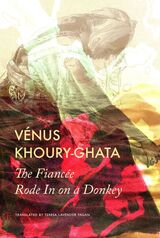
For two days the rabbi rides on a donkey to find the ideal fiancée. Legs and arms shaved, hands dyed with henna, a girl to be married must shine like a mirror. Every girl hopes to be the chosen one and ride off on a donkey to live in the city. The desert is the domain of men; they believe they see oases and palm trees sagging with fruit, while women see only sand on top of sand. A rapid look-around at the girls in the circle was enough for the traveling rabbi to find the right one. He chooses Yudah because of her name, a contraction of Yahuda, and because she lowered her eyes when he looked at her.
The Fiancée Rode In on a Donkey tells Yudah’s story. Instead of experiencing her dream of being chosen and riding off on a donkey to live in a palace, she finds herself in an encampment of tents swaying in the wind. She also doesn’t find the Emir, who is battling on other fronts and soon surrenders. Yudah and the rest of his followers are exiled to Ile Sainte-Marguerite, where she pursues a tireless quest for her future husband in France, seeking a man she has never seen. Will the fantastic destiny of the young girl from the desert ever be fulfilled?
In lyrical novel after novel, Vénus Khoury-Ghata chooses overlooked individuals from history and brings them back to life on the page. Hauntingly unforgettable, The Fiancée Rode In on a Donkey is yet another poetic narrative from one of the most respected French authors of our times.

If not for a horse, would Alexander have been the Great? William, the Conqueror? Richard, the Lionhearted? If not for their awesome mounts, would the Spaniards have had their way with the New World? Would Paul Revere have spread the word? Would the West have been won?
It is hard to comprehend how far horse power has carried us, difficult to imagine, in our era of mechanical wizardry and speed, what role the horse has played in shaping human history. This is the challenge Juliet Clutton-Brock takes up in her book, a splendid blend of natural and social history that recounts the horse's story as it has figured in—and transfigured—our own.
By drawing on biological, archaeological, and historical evidence, Clutton-Brock describes the wild horse and the wild ass, from their widespread distribution at the end of the last Ice Age to their near extinction today. She shows how these beasts, once hunted for meat, were drafted for work and domesticated as humans began to grasp the possibilities of riding horseback. This discovery, with the speed, distance, and power it offered, transformed the course of history. This elegant tale of the horse and donkey, wonderfully written and handsomely illustrated, revives the true meaning of "horse power."
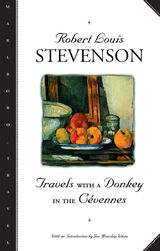
Stevenson's third book, Travels with a Donkey was originally intended as a lighthearted sketch, a companion-piece to his recent Inland Voyage. Although he would not be recognized as a major author until the publication of Treasure Island and Dr. Jekyll and Mr. Hyde, one can see his voice developing. Full of charm and instruction, Travels with a Donkey serves as a guide to alternatives to the restless and distracted standard of contemporary travel.
READERS
Browse our collection.
PUBLISHERS
See BiblioVault's publisher services.
STUDENT SERVICES
Files for college accessibility offices.
UChicago Accessibility Resources
home | accessibility | search | about | contact us
BiblioVault ® 2001 - 2024
The University of Chicago Press


